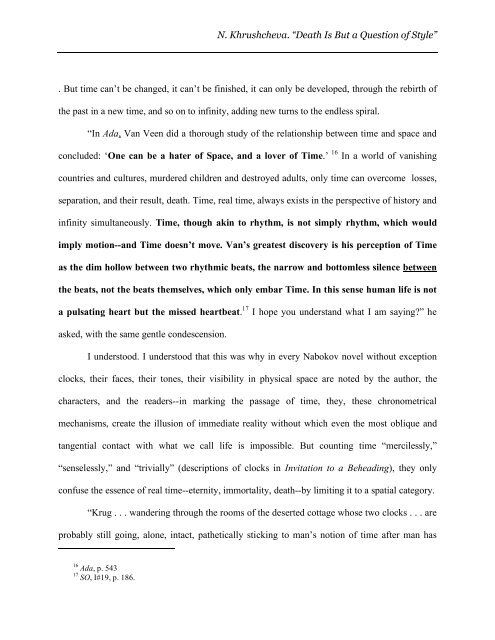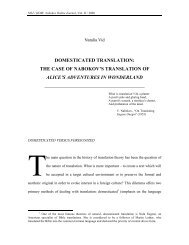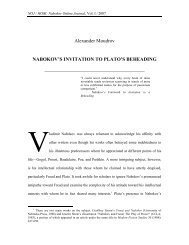Nina L. Khrushcheva DEATH IS BUT A QUESTION OF STYLE 1
Nina L. Khrushcheva DEATH IS BUT A QUESTION OF STYLE 1
Nina L. Khrushcheva DEATH IS BUT A QUESTION OF STYLE 1
You also want an ePaper? Increase the reach of your titles
YUMPU automatically turns print PDFs into web optimized ePapers that Google loves.
N. <strong>Khrushcheva</strong>. “Death Is But a Question of Style”<br />
. But time can’t be changed, it can’t be finished, it can only be developed, through the rebirth of<br />
the past in a new time, and so on to infinity, adding new turns to the endless spiral.<br />
“In Ada, Van Veen did a thorough study of the relationship between time and space and<br />
concluded: ‘One can be a hater of Space, and a lover of Time.’ 16 In a world of vanishing<br />
countries and cultures, murdered children and destroyed adults, only time can overcome losses,<br />
separation, and their result, death. Time, real time, always exists in the perspective of history and<br />
infinity simultaneously. Time, though akin to rhythm, is not simply rhythm, which would<br />
imply motion--and Time doesn’t move. Van’s greatest discovery is his perception of Time<br />
as the dim hollow between two rhythmic beats, the narrow and bottomless silence between<br />
the beats, not the beats themselves, which only embar Time. In this sense human life is not<br />
a pulsating heart but the missed heartbeat. 17 I hope you understand what I am saying?” he<br />
asked, with the same gentle condescension.<br />
I understood. I understood that this was why in every Nabokov novel without exception<br />
clocks, their faces, their tones, their visibility in physical space are noted by the author, the<br />
characters, and the readers--in marking the passage of time, they, these chronometrical<br />
mechanisms, create the illusion of immediate reality without which even the most oblique and<br />
tangential contact with what we call life is impossible. But counting time “mercilessly,”<br />
“senselessly,” and “trivially” (descriptions of clocks in Invitation to a Beheading), they only<br />
confuse the essence of real time--eternity, immortality, death--by limiting it to a spatial category.<br />
“Krug . . . wandering through the rooms of the deserted cottage whose two clocks . . . are<br />
probably still going, alone, intact, pathetically sticking to man’s notion of time after man has<br />
16 Ada, p. 543<br />
17 SO, I#19, p. 186.
















